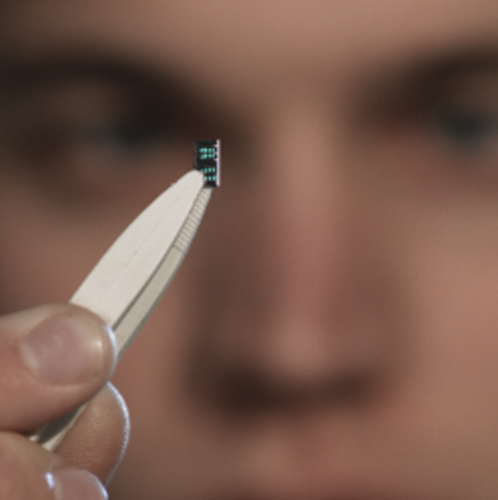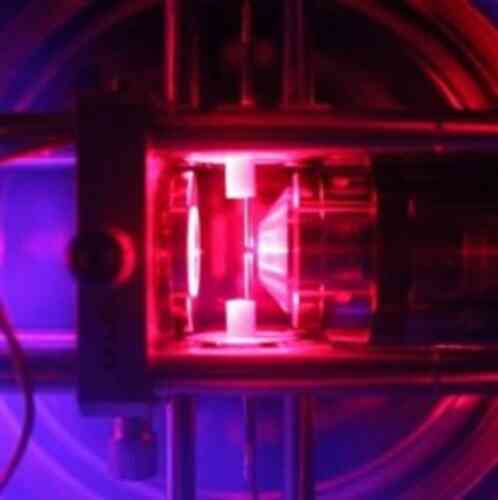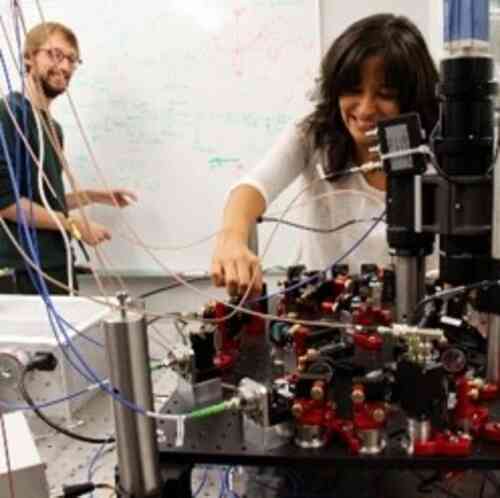ICFO decide game
Group 1 – Participant 1
Story cards
Read all the cards from this category, choose the one that looks more interesting to you and explain it to the rest of the group.
ISIDORA ISIBARNE
Story Card 2
I work for a company that designs and builds lasers: we make small ones, like the pointers you can buy in the neighborhood store, or industrial lasers that can accurately cut all kinds of material or even weld metals.
I really like my job because our products can meet the very different demands of our customers: there are some that need extreme precision to be able to manufacture the microcircuits that are inside our smartphones and tablets, and others that require high power to weld the components of a car or make incisions in pistons of aircraft engines in a precise and reproducible way to increase their efficiency.
photonics everywhere
Francesca falcó
Story Card 5
No sé com ho faria sense internet: tota la música que escolto, les històries que llegeixo, les fotos que comparteixo amb els amics, els vídeos que miro,… tot està al núvol!
Sabíeu que el núvol no és tan eteri com el nom ens pot fer pensar?
Per poder distribuir informació arreu del món de manera ultra ràpida és necessària una xarxa de fibres òptiques que connecta físicament tots els continents i ciutats passant fins i tot pel fons dels oceans. Així l’enorme quantitat de dades que s’envia cada segon pot arribar als nostres dispositius en un no res, siguin les dades necessàries per fer funcionar un hospital o un vídeo de gatets, i tot transportat per fotons!
Informació i ciberseguretat
alina anderson
Story Card 12
A few weeks ago I got the job of my dreams: I’m working at a maker space, where I can tinker with all the machines they have. I love the flexible structures that can be obtained by cutting wood: without the precision of lasers, they wouldn’t be so easy to do! I’m also fascinated by the new 3D printer: thanks to its laser, we can quickly reproduce plastic parts that makers on the other side of the world have designed. It’s almost like the teleporters of science fiction movies!
photonics everywhere
info cards
Read all cards from this category, choose the two that look more interesting and explain them to the rest of the group.
ICFO, A different and diverse place
Info Card 2
Diversity is a key element to find creative and original solutions to problems: this is why diversity is an important asset for a scientific research center. At ICFO, there are people of more than 60 nationalities with diverse backgrounds (there are people who studied physics, chemistry, engineering, biology, neuroscience, mathematics, computer science, ...): with this mixture of cultures, languages and experiences it is easier to create an open and tolerant environment where new ideas can thrive and grow.
photonics everywhere
quantum technologies
Info Card 10
Quantum physics describes the world at the atomic and molecular scale: in recent years, the scientific community has learned to take advantage of phenomena that appear at the microscopic scale to create new technologies.
Quantum technologies are expected to improve the way some physical systems are studied, the security of our communications, the computational speed of computers, and the sensitivity of sensors.
With more than half of its groups working in these fields, ICFO joins its efforts with other research centers and companies that are actively involved in local (QuantumCAT) and international (European Quantum Flagship) networks that aim to accelerate the arrival of these technologies within the reach of society.
information and cybersecurity
optical tweezers
Info Card 19
A well-focused photon beam can trap objects and move them in a delicate and precise way: this is not science fiction, but an extremely useful and versatile photonic technique that earned its inventor the Nobel Prize.
You can find optical tweezers in various ICFO laboratories in different areas of application: for example, they are used to trap atoms in order to better understand their properties, to measure the mobility and elasticity of some cells or to study small objects on the border between quantum and classical physics.
(Foto: Optical tweezers in one of the ICFO laboratories)
photonics everywhere
some of the coldest corners of the world
Info Card 20
ICFO has some of the coldest corners in the world, but no one can get in. There the temperature is lower than in deep space: only small fractions of a degree (hundreds of nanokelvins) above absolute zero.
Only a few laboratories in the world can reproduce these conditions in small vacuum chambers, where they can trap small quantities of atoms (from a few million to a single one, depending on the experiment): in order to be able to study the interesting quantum properties that appear at such low temperatures, it is fundamental that the atoms are as cold (and therefore as still) as possible.
(Foto: One of the ICFO laboratories where they cool atoms close to absolute zero.)
photonics everywhere
thinking cards
Read all the cards from this category, choose the one that looks more interesting to you and explain it to the rest of the group.
peer review
Thinking Card 6
Unlike radio or TV talk shows, in science not all opinions have the same value. Only if you can support your thesis with experimental evidence and logical reasoning your discovery will be accepted by the scientific community.
Therefore, journals publishing scientific results use the principle of peer review: a new result can only be published if it is accepted by a group of experts in that field who carefully examine the methods and conclusions of that research.
Does it make sense to adopt this system or does it slow down the flow of useful new knowledge that should be shared quickly, such as new discoveries about the SARS-CoV-2 virus?
in person or virtual?
Thinking Card 16
Conferences are the perfect opportunity for scientists to share their work with colleagues around the world, exchange ideas, and establish new collaborations.
In recent years, the climate emergency has begun to open the debate on whether travel should be reduced in favor of virtual events, which do not allow socialization and bonding to occur naturally as in a in person conference.
The 2020 pandemic has accelerated this debate: should scientific meetings be in person or virtual?
DECISIon
The time and resources available to solve important problems affecting society are limited. Imagine being part of the commission that has to decide how to invest the money for photonics research at European level for the coming years: knowing that photonics benefits society in many different ways, how would you distribute funds among the different research fields in photonics?
This is not an individual decision: each group must come to a unanimous conclusion by discussing correctly and rationally based on the facts that you have learned so far. There is no right or wrong answer. Like many things in life, it depends on the point of view you assume, the priorities you set, ...
light for health
Option 1
The pandemic that arose in 2020 taught us that public health is an important sector that affects many more aspects of society. A tiny virus can affect the lives of millions of people in all its aspects, not only health, but also the economy, industrial structure, labor market ...
That’s why it’s important to focus most of our efforts on research projects that can improve and care for people’s health.
light for information and cybersecurity
Option 2
We live in the information age. More and more companies and institutions are collecting and analyzing large amounts of data to improve industrial processes and services for the population. In addition, digital technologies are essential to communicate with each other, whether for work or fun. If information systems fail, strategic structures such as energy networks, traffic control, hospitals, governments, etc. fail, too. Thus, ensuring data security for quick and massive data transfer is of fundamental importance for a digitized society like ours.
That is why it is important to focus most of our efforts on research projects that can improve data collection, analysis, transmission and security.
light for energy and the environment
Option 3
We are in the middle of a climate emergency: to be able to solve it we need new environmental policies and the commitment of society as a whole. Science and technology can accelerate the change of paradigm that we need to save the planet with discoveries and innovative technologies. If we do nothing now, the Earth will be uninhabitable and unsustainable, but there’s still time.
That’s why it’s important to focus most of our efforts on research projects that can help us take care of our planet.
photonics everywhere
Option 4
Photonics is everywhere and has a positive impact in many different aspects of our lives. Sometimes, the same technology (such as the laser) can improve health, information and care for the environment at the same time. There are many global issues and it is difficult to set a priority, especially because they are interconnected.
That’s why it’s important not to focus our efforts on a single field of application: it’s better to diversify our efforts to have more chances of success.













